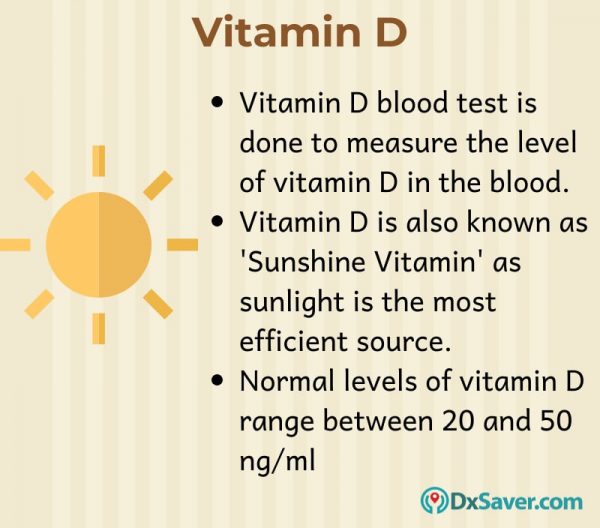Vitamin D Blood Test Cost In India

Vitamin D test is a blood test ordered by your physician to measure the level of vitamin D in the blood. Vitamin D is very important for healthy bones and teeth as it helps in calcium absorption. Over time, vitamin D deficiency can lead to fatal complications. So we recommend everyone who experiences the symptom or at a higher risk of vitamin D deficiency to get tested for vitamin D levels in the body.
The article below covers all the significant topics related to vitamin D blood tests like vitamin D test cost, what is vitamin D, vitamin D foods, symptoms and risk factors of vitamin D deficiency, normal vitamin D levels, preparation, risks, and how to get tested for the vitamin D blood test.
- Vitamin D test cost.
- What is vitamin D?
- Vitamin D rich foods.
- Why is a vitamin D test done?
- Normal vitamin D level.
- How is the vitamin D test done?
- Is there any preparation required before the test?
- Are there any risks in the test?
- What are the complications of high and low levels of vitamin D?
- How to manage high and low vitamin D levels?
- Provider Locations.
For our readers, who are very much interested in knowing the vitamin D test cost beforehand, we would like to begin with that section.
How much does the vitamin D test cost?
Vitamin D test cost ranges between $59 and $81 in different labs and facilities across the U.S. No prior appointment is required. Compare the price, order your test online and visit the nearest lab during lab business hours. Complete the procedure and get the results in your email in 2 to 3 business days. Doctor consultation is also available for further treatment or any kind of medical advice.
The following table shows the Vitamin D test cost at 3 of our partner laboratories (CLIA – Certified) network located across the U.S.
Name of our Partner Labs | Book Online |
HealthLabs
| Offer Price$59 Book Now |
Health Testing Centers
| Offer Price$69 Book Now |
Personal Testing Lab
| Offer Price$81 Book Now |
Vitamin D test cost with insurance
Most of the health insurance companies in the U.S. cover the vitamin D blood test cost. However, the coverage offered by private health insurance companies and national health insurance programs like Medicare and Medicaid varies widely. So we recommend you to check the coverage of your health insurance plan before getting tested for vitamin D.
Our vitamin D testing providers do not accept any kind of health insurance plan. But, on request, they can provide you with an itemized receipt containing all the details like the name and code of the test, and CPT code that is necessary for insurance reimbursement purposes.
What is vitamin D?
Vitamin D is a group of fat-soluble nutrients. It is also known as the sunshine vitamin as it is produced by the body in response to the exposure to the sun. It can also be consumed in foods and supplements.
The main role of vitamin D is to regulate the levels of calcium, phosphorus, and magnesium in the blood. It is also essential for various body functions such as maintaining the health of bones and teeth, regulating the cell growth and the insulin levels, helping in diabetes management, and supporting lung function, brain, and the nervous system.

Vitamin D rich foods
Sunlight is the most efficient and a good source of Vitamin D. Vitamin D is also found in the following list of foods.
- Fish oil
- Cod liver oil
- Fatty fish like salmon
- Cooked swordfish
- Raw maitake mushrooms
- Egg
- Chicken
- Fortified skim milk
- Cheese
- Canned tuna

Why is a vitamin D test done?
Vitamin D blood test is done to measure the level of 25 hydroxyvitamin D in the blood. In humans, there are two forms of vitamin D namely vitamin D2 and vitamin D3. Vitamin D2 and D3 are changed into a form of 25 hydroxyvitamin D [25-(OH)D] in the bloodstream.
Your physician might order a vitamin D blood test if he/she suspects you of a lack of vitamin D symptoms in the blood. If you have vitamin D deficiency, you will experience the following symptoms.
- Weakness
- Fatigue
- Bone pain
- Bone softness
- Pain in the back
- Hair loss
- Muscle pain
- Obesity
- Digestive problems
- Bone malformation (in children)
The following people who are at risk of low levels of vitamin D or vitamin D deficiency are also recommended to get tested.
- People above 60 years of age
- Obese people
- People who don't have exposure to sunlight
- Babies that are only breastfed
- People with Crohn's disease or Celiac disease (the diseases that affect the intestines and making them difficult to absorb the nutrients)
- People who have undergone gastric bypass surgery
Sometimes, your physician will also order a vitamin D blood test to monitor the effectiveness of ongoing treatment for vitamin D deficiency.
Normal vitamin D levels
The normal levels of vitamin D range between 20 and 50 ng/ml (nanograms per milliliter). People between 12 and 20 ng/ml are considered to have a potential deficiency of vitamin D whereas people below 12 ng/ml are considered to have lack of vitamin D in the blood. People above 50 ng/ml are considered to have high levels of vitamin D.
How is the vitamin D test done?
A vitamin D test is a simple test done using a sample of blood. During this test, the phlebotomist will wrap a tight elastic band around the upper arm to make the vein visible and swell with blood. The area to be injected will be cleansed with a disinfectant liquid. Then, he/she will inject the needle into the vein to draw a sample of blood. After removing the needle, he/she will ask you to apply some pressure on the injected area with a cotton ball or a band-aid to stop bleeding. The blood sample collected in a test tube is sent to the lab for further testing.
It takes less than 5 to 10 minutes to perform this test.
Is there any preparation required before the test?
There is no special preparation required before the test. If you have any abnormal bleeding disorder, inform your physician or the phlebotomist before the test.
Are there any risks in the test?
There are no possible risks or complications in taking the vitamin D blood test. Some people might feel dizziness, slight pain, bruise, or redness in the injected area for a very little period after the blood sample is drawn.
What are the complications of high and low levels of vitamin D?
The following are the complications of high and low vitamin D levels.
High levels of vitamin D
High levels of vitamin D can lead to higher levels of calcium in the blood resulting in bone pain and kidney problems such as the formation of kidney stones.
Low vitamin D levels
Lack of vitamin D can lead to hyperparathyroidism that causes loss of bone density and increased fractures. If left untreated, low vitamin D levels
- Cardiovascular diseases
- Autoimmune disorders
- Diabetes
- Alzheimer's disease
- Certain types of cancers
How to lower high levels of vitamin D
People with high vitamin D levels should follow an adjusted, proper diet, and stop vitamin D intake. Sometimes, medications such as corticosteroids and bisphosphonates will be prescribed to lower the levels of vitamin D in the blood.
How to elevate low vitamin D levels
Treatment for people with low vitamin D levels include
- Increased exposure to skin
- Daily vitamin D supplements
- Including high sources of vitamin D foods in the diet
Provider Locations
Vitamin D blood test can be done in any of the following locations across the U.S. by visiting the nearest lab. To know the vitamin D test cost, refer to the first section of the article.
- Alabama
- Arizona
- Arkansas
- California
- Colorado
- Connecticut
- Delaware
- Florida
- Hawaii
- Georgia
- Idaho
- Illinois
- Indiana
- Iowa
- Kansas
- Kentucky
- Louisiana
- Maine
- Michigan
- Minnesota
- Mississippi
- Missouri
- Montana
- Nebraska
- Nevada
- New Hampshire
- New Mexico
- North Carolina
- North Dakota
- Oklahoma
- Oregon
- Pennsylvania
- Puerto Rico
- South Carolina
- South Dakota
- Tennessee
- Texas
- Utah
- Vermont
- Virginia
- Washington
- West Virginia
- Wisconsin
- Wyoming
Frequently Asked Questions
Will insurance cover my testing cost?
No, insurance will not be covered in the billing. However, they will provide you a receipt for insurance reimbursement purposes.
How should I book my appointment?
You can choose the most suitable provider from above and make an appointment by following the instructions mentioned by them.
Can I cancel my lab test order?
Yes, you can cancel your lab test order anytime before your testing. A refund will be initiated after deducting the cancellation fee. However, cancellation is at the discretion of the provider.
Do the providers offer result interpretations?
Yes, a few providers may provide doctor consultation who will take you through the results and provide clarification if needed.
How do I receive my report?
To ensure your privacy, the test report will be mailed to you by the provider.
Other topics you may be interested in:-
- STD Testing Cost in the U.S.
- Eye Chlamydia Symptoms
- What STDs cause Sore Throat?
- Gonorrhea Symptoms in Men
- Celiac Disease Test Cost in the U.S.
- At-Home Chlamydia Testing Cost in the U.S.
- Cost of PSA Test for Prostate Cancer in the U.S.
- Vitamin B12 Test Cost in the U.S.
- Cost of Amylase Test in the U.S.
- How much does the Lipase Test Cost in the U.S?
- Testosterone Test Cost in the U.S.
- Cost of Homocysteine Test in the U.S.
- What is Metabolism and its Normal Levels?
- Causes of Penile Rashes and Other STD Symptoms in Men
- How much does the Urine Culture Test Cost in the U.S?
- Importance of Ferritin Hormone, Normal Levels, Diagnosis & Treatment
- HPV in Women: Symptoms, Genital Warts, Treatment and More
- LDH Hormone Normal Levels, Abnormal Levels Symptoms, Diagnosis & Treatment
Summary

Author Rating





Aggregate Rating
5 based on 63 votes
Brand Name
DxSaver.com
Product Name
Vitamin D Test
Price
USD 59
Product Availability
Available in Stock
Vitamin D Blood Test Cost In India
Source: https://www.dxsaver.com/vitamin-d-test-cost/


0 Komentar